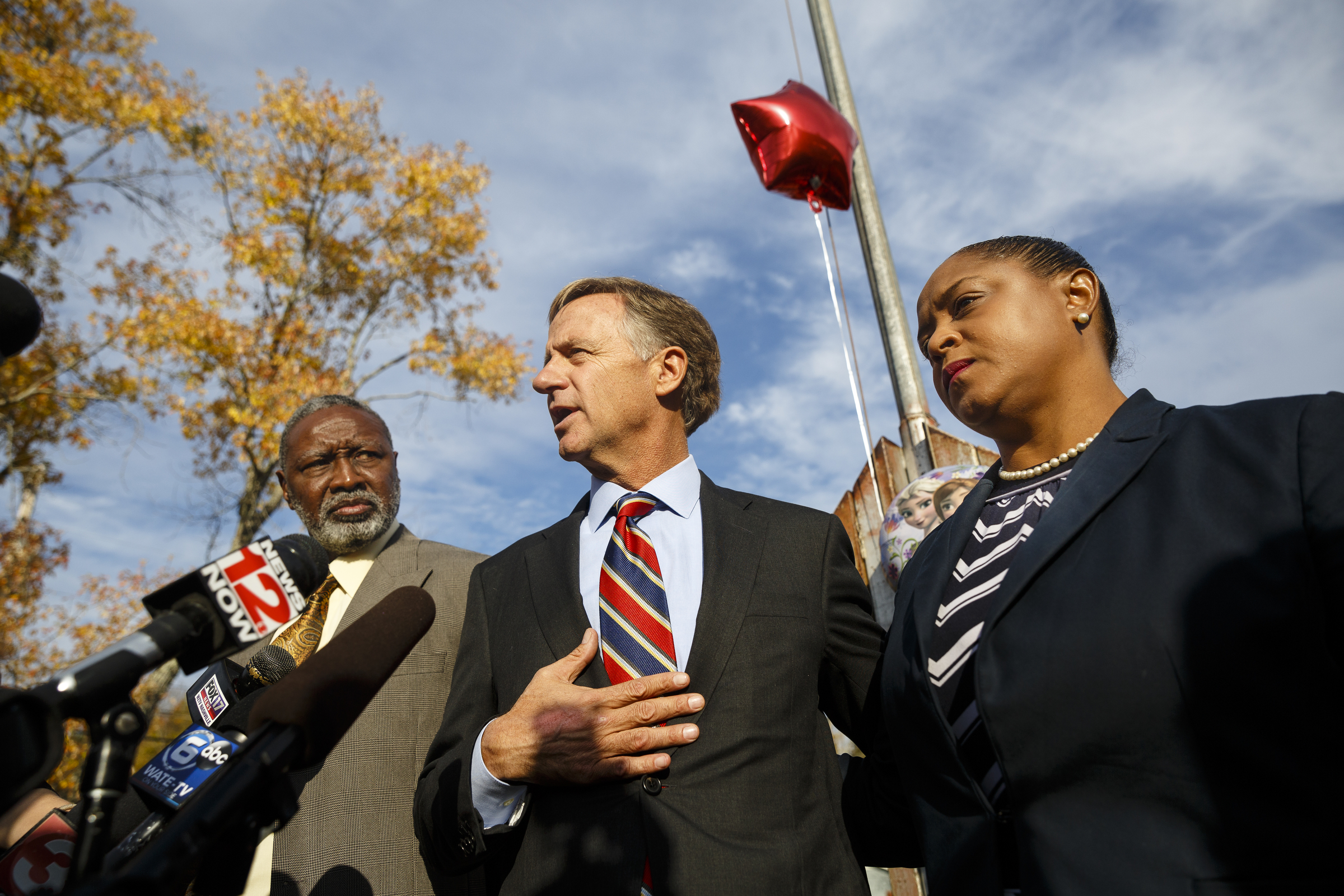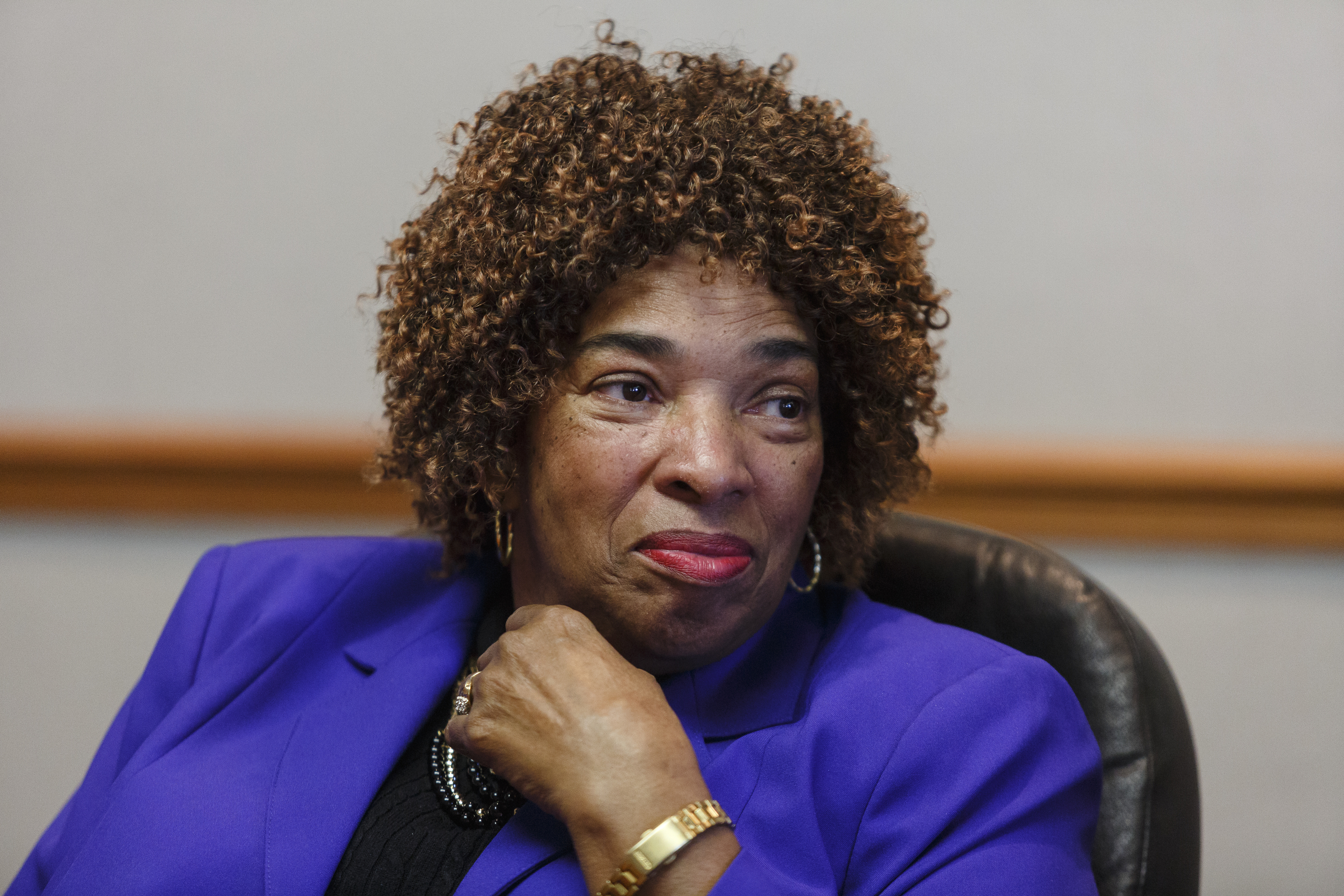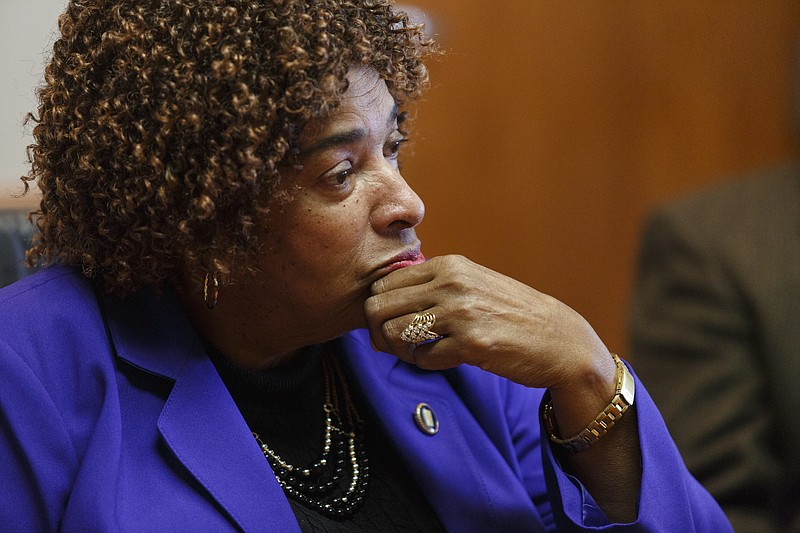NASHVILLE - Spurred by last November's deadly Woodmore Elementary School bus crash, local lawmakers this year pushed a bill in the Tennessee General Assembly that would require buses come equipped with lap-shoulder seat belts, only to see the measure stall.
But Rep. JoAnne Favors, D- Chattanooga, and Sen. Todd Gardenhire, R-Chattanooga, said they will renew the effort in 2018 in hopes of getting something through despite opposition from some school districts, bus owners and a number of mostly rural lawmakers.
"I think we're going to have more support than was anticipated," said Favors, whose House District 28 includes both Woodmore and the bus crash site in Brainerd. "I still feel very good about it."
Gardenhire added: "I think some form will pass. It won't be the form we brought out last year. It'll just be too expensive."
Rather, the senator said, he's leaning on legislation that would give local districts options as buses reach the state's mandatory 18-year limit on use.
Lingering safety concerns from a fatal 2014 Knoxville bus crash reignited after the Woodmore crash Nov. 21, 2016.
The Favors-Gardenhire bill sought to require three-point, lap-and-shoulder safety harnesses on all public school buses by mid-2023. But legislative analysts estimated the bill would cost the state $58.7 million and local governments $423.4 million to replace all buses, because they couldn't be retrofitted.
 Hamilton County Interim School Superintendent Dr. Kirk Kelly, Tennessee Gov. Bill Haslam, and Woodmore Principal Brenda Adamson-Cothran, from left, speak at a news conference at Woodmore Elementary School on Wednesday, Nov. 23, 2016, in Chattanooga, Tenn. Gov. Haslam visited the school following Monday's school bus crash that killed 5 children and injured dozens more.
Hamilton County Interim School Superintendent Dr. Kirk Kelly, Tennessee Gov. Bill Haslam, and Woodmore Principal Brenda Adamson-Cothran, from left, speak at a news conference at Woodmore Elementary School on Wednesday, Nov. 23, 2016, in Chattanooga, Tenn. Gov. Haslam visited the school following Monday's school bus crash that killed 5 children and injured dozens more.
Opponents cited the costs but also argued that school buses, because of their special seat compartmentalization, are considered among the safest vehicles on the road. And they contended disruptive students wouldn't use the safety harnesses or would use them to hit each other.
"Who's the monitor, who's the [school resource officer] to help these children out of their seat belt?" asked House Transportation Subcommittee Chairwoman Terri Lynn Weaver during an April hearing. She also fretted about young children trapped in buses that catch fire.
While "every life is priceless," she said, the bill "is based on emotion, and any kind of legislation that is based on emotion is usually not good policy."
But it received a boost from Erlanger physicians who treated some of the children hurt in the crash.
As Woodmore families and some of the children watched, the physicians described the injuries in graphic detail to lawmakers. The physicians believed restraints would have kept most children in their seats, lessening the carnage.
As the bill began moving, Favors tackled the cost problem.
The implementation deadline disappeared, and the bill only requires that new buses carry safety belt systems recommended by the National Transportation Safety Board, which says restraints improve children's safety.
The NTSB investigated the Chattanooga crash and is expected to issue a report.
The amended Favors-Gardenhire bill, which several Knox County lawmakers signed onto, would send an estimated $2.15 million a year to local systems. Statewide, those systems would see their costs increase by $12.9 million a year.
Favors got the bill through four separate committees and subcommittees before putting it on hold in the House Finance Subcommittee. It's still there, and in the Senate Finance committee. The two lawmakers can try to move it next year if they believe they have the votes.
Gov. Bill Haslam had a much easier path for his own legislation to help prevent future school bus tragedies.
The new law he backed requires public school districts and public charter schools to appoint transportation supervisors with clear lines of accountability on addressing problems and parent and citizen complaints. Those were issues in Hamilton County.
The legal age to drive a bus rose from 21 to 25. And would-be drivers must complete a course devised by the Tennessee Department of Education and the Department of Safety and Homeland Security.
Education spokeswoman Sara Gast said Tammy Knipp was appointed to state director of transportation and is leading an advisory body that is assessing needs, establishing driver training standards and identifying best practices in transportation management.
Haslam did not support the Favors-Gardenhire safety restraint system bill, although he eventually told the Times Free Press that if it passed he would find money to fund it. Whether that offer is in effect in 2018 remains to be seen.
"There continues to be debate over mandating seat belts on school buses, and it's an issue we will continue to discuss with the General Assembly," Haslam press secretary Jennifer Donnals said in an email. "With that said, working with the Legislature, we were able to pass legislation earlier this year that creates more oversight and training around school transportation, which we are confident will enhance student safety."
not wearing them. A truck then T-boned the bus.
 State Sen. Todd Gardenhire
State Sen. Todd Gardenhire
 Tennessee State Rep. JoAnne Favors during a meeting with the Times Free Press editorial board at the newspaper's offices on Tuesday, Jan. 24, 2017, in Chattanooga, Tenn.
Tennessee State Rep. JoAnne Favors during a meeting with the Times Free Press editorial board at the newspaper's offices on Tuesday, Jan. 24, 2017, in Chattanooga, Tenn.
During the struggle, Favors, Gardenhire and the several Hamilton County and Knox County lawmakers who signed onto the bill picked up a corporate ally - Indiana-based IMMI, which manufactures SafeGuard seats for school buses.
The seats have three-point lap-shoulder seat belts, the type of restraint system recommended by federal officials.
This summer, Favors and Gardenhire watched an IMMI demonstration. A bus was loaded with crash-test dummies, some wearing safety harnesses and others
"The first thing I learned was that without some kind of restraints on, the kids and adults just fly all over the place when there is an impact of the vehicle," Gardenhire said.
He also noticed the constraints "cut down drastically" on misbehavior.
"It let the bus driver focus on driving and not maintain a lot of discipline," he said.
Earlier this year, IMMI hired Nashville-based CivicPoint LLC to lobby in support of the bill.
"Tennessee parents know their children are safer in seat belts," said attorney Tom Lee, a managing partner at Civic- Point. " That's why the conversation has changed dramatically. That's why the General Assembly's Education and Transportation committees have approved the bill. And that's why it's going to pass in 2018."
As for the argument about belted students being unable safely to exit a burning bus, Lee said, "First, kids know how to undo seat belts. They've been doing it since they were toddlers. Second, what takes time getting off a bus is not unfastening a seat belt, it's the line out the door.
"Most important," Lee added, "in the hundreds of thousands of miles already ridden by students in seat belts, not one student ever has been hurt in a school bus fire because they couldn't get out of their seat."
Contact staff writer Andy Sher at asher@timesfreepress.com or 615-255-0550. Follow him on Twitter @AndySher1.
Woodmore Elementary school bus crash
- Community holds vigil to honor victims of fatal Woodmore school bus crash [photos]
- One year later: Have school buses gotten safer since the Woodmore crash?
- The legislation: Advocates hope to pass school bus seat belt bill in 2018
- The neighbors: Talley Road residents recount details of deadly crash
- Cooper: Woodmore bus crash offered lessons, realities
- A year of grief: Mother recalls tragic day she lost her daughter
- The first responders: Paramedics, police officers recall scene of crash [photos]
- Lawsuit: Woodmore employees say bus company responsible for emotional trauma
- Two more lawsuits point to negligence in deadly Woodmore bus crash
- Three more civil claims filed in Woodmore crash case
- Bus coalition says Durham drivers want to share safety concerns
- American Red Cross of Southeast Tennessee honors local heroes
- Hamilton County 911 receives award for response to Woodmore crash
- School bus driver in deadly Woodmore crash released from jail after making bond
- Trial date set for driver in fatal Woodmore Elementary School bus crash
- Lawsuit: Mother of child who died in Woodmore bus crash was tricked into legal agreement
- Bus driver in deadly Woodmore crash placed on supervised release
- State attorneys receive new information in Woodmore solicitation case
- Chattanooga firefighters recognized with 'Governor's Certificate' for Woodmore response
- Judge denies alternative sentence request for bus driver in deadly Woodmore crash
- Attorney: Second vehicle involved in deadly Woodmore bus crash
- Court date delayed for bus driver charged in Woodmore case
- Victim's mom posts court documents on Facebook, complicating trial in deadly Woodmore bus crash
- Woodmore bus driver faces additional charges after prosecutors pledge to bring more counts
- Prosecutors plan to bring more charges against Woodmore bus driver
- Attorney says Woodmore bus driver should get alternative sentence
- Texas firm denies any solicitation of Woodmore victims
- Woodmore families protest after school board renews bus company contract [photos]
- Out-of-town jurors will decide Johnthony Walker's fate in Woodmore bus crash trial
- Tennessee AG files lawsuit against Texas firm accused of deceiving Woodmore families
- Child Services confirms agency has been investigating Woodmore bus driver
- Woodmore: Johnthony Walker's attorney wants out-of-town jury
- Judge rules Woodmore attorneys can ask for pre-accident info from bus company
- Twelfth civil lawsuit filed in Woodmore bus crash
- New Woodmore lawsuit takes aim at predatory law firms
- New lawsuit accuses law firms of preying on Woodmore victims
- Two more lawsuits filed in connection to fatal Woodmore bus crash
- Law enforcement to follow, randomly ride in Hamilton County school buses in wake of fatal crash
- NTSB report recounts events leading up to fatal Woodmore school bus crash
- Woodmore Fund completes distribution of more than $500,000 in gifts from community to families
- Woodmore responders recount crash nightmare
- Woodmore bus crash: Can county turn back clock on bus privatization?
- Despite Woodmore crash, Hamilton County likely will extend contract with same bus company
- Tennessee's attorney general vows to take on any law firms that exploit the Woodmore crash victims
- Driver in fatal Woodmore school bus crash had previous accidents, infractions in personnel file
- Lawsuit filed against Hamilton County Schools in connection with fatal Woodmore bus crash
- Industry experts warn of predatory law firms in wake of Woodmore bus tragedy
- Woodmore Fund releases video appeal for relief funds ahead of holidays
- Last 2 Woodmore patients released from Erlanger to rehab facility [video]
- Sixth Woodmore bus crash lawsuit targets bus manufacturer]
- Two Woodmore bus crash victims still in Erlanger Children's Hospital
- Woodmore Fund begins to help families affected by fatal bus crash in Chattanooga
- Fourth and fifth lawsuits filed in Woodmore bus crash
- Remaining hospitalized children in Woodmore bus accident in fair condition
- Third lawsuit says bus crash causes child to suffer disfigurement, brain injury
- Durham claims it wasn't aware of all complaints against driver in deadly bus crash [photos]
- Chattanooga school bus driver refuses to speak with investigators in fatal crash probe
- School bus company addresses driver complaints prior to fatal bus crash, promises change [video]
- Second family files negligence lawsuit in connection with deadly bus crash
- Hearing for bus driver in Woodmore crash delayed
- School bus strikes pedestrian in Brainerd one week after deadly Woodmore crash
- Three Woodmore students still in critical condition; 5 total remain hospitalized
- No kids were on school bus that hit pedestrian on Brainerd Road
- Man allegedly using Woodmore victims to scam people for money
- Zyaira Mateen, 6: The girl who loved to read and dance
- D'myunn Brown: Six-year-old remembered as smart, funny
- Zyanna Harris, 10: Girl had energy and spunk
- Cor'Dayja Jones, 9: Fourth-grader was sweet and shy
- Keonte Wilson, 8: Rambunctious boy was youngest of four
- Zoie Nash, 9: She was cheerful and laid-back
- In the wake of the fatal bus crash, Chattanooga stands strong
- Cook: The Hallelujahs of Woodmore Strong
- Tennessee law caps damages for Woodmore victims, families
- Bus driver in fatal crash told school employee 'he did not care about the students,' school records show
- Family of bus crash survivor finds much to be grateful for
- Community gives $112,000 to families of children killed in bus crash
- Parents say they warned district employees before crash that bus driver drove too fast and was reckless
- Life-saving stability control mandatory in new cars but not required for school buses [video]
- A sixth child in Woodmore bus crash has died
- NTSB says Talley Road not on designated route for bus in fatal crash
- First lawsuit filed in connection with Monday's fatal bus crash
- Local agencies launch fund for families of school bus crash victims
- Brainerd crash: New details emerge on history of driver, bus company
- Families mourn Woodmore Elementary students killed in school bus crash
- Tragedy leaves many area first responders emotionally scarred
- Local lawmakers favor push for mandatory seat belts on school buses
- Community gathers at prayer vigil for victims of fatal school bus accident
- Neighbors recount moments following Monday's fatal crash, say driver had reputation for speeding
- Johnthony Walker crashed bus months before fatal accident
- A nation reacts to Monday's school bus crash tragedy
- McCormick to push bill requiring all Tennessee school buses have seat belts
- Haslam says 'time to have that conversation' about school bus safety
- Neighbors of the bus driver charged with vehicular homicide said he was 'just an ordinary guy'
- School bus service provider had 346 crashes in last two years, records show'
- Families identify all five children killed in bus crash
- Community rallies to support Woodmore families
- Blood Assurance needs O-negative blood donations
- School bus driver in fatal accident graduated from Brainerd
- 6 students in ICU after school bus driver charged in crash that killed Woodmore Elementary students
- Erlanger doctors say kids dazed, couldn't spell names on arrival
- Officials report multiple fatalities in school bus crash on Talley Road
 Hamilton County Interim School Superintendent Dr. Kirk Kelly, Tennessee Gov. Bill Haslam, and Woodmore Principal Brenda Adamson-Cothran, from left, speak at a news conference at Woodmore Elementary School on Wednesday, Nov. 23, 2016, in Chattanooga, Tenn. Gov. Haslam visited the school following Monday's school bus crash that killed 5 children and injured dozens more.
Hamilton County Interim School Superintendent Dr. Kirk Kelly, Tennessee Gov. Bill Haslam, and Woodmore Principal Brenda Adamson-Cothran, from left, speak at a news conference at Woodmore Elementary School on Wednesday, Nov. 23, 2016, in Chattanooga, Tenn. Gov. Haslam visited the school following Monday's school bus crash that killed 5 children and injured dozens more.

